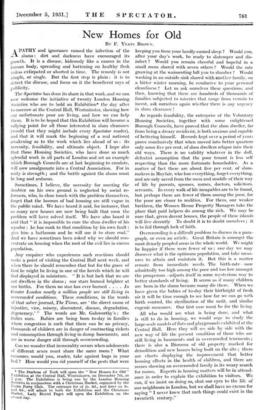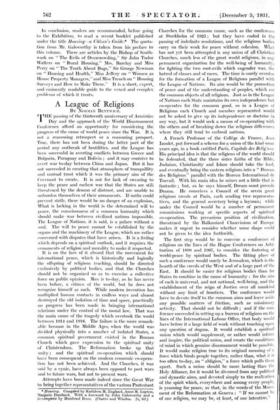New Homes for Old By F. YEATS BROWN.
APATHY and ignorance caused the infection of the slums : dirt and darkness have encouraged its growth. It is a disease, hideously like a cancer in the human body, spreading and battening on healthy flesh unless extirpated or aborted in time. The remedy is not simple, or single. But the first step is plain : it is to detect the disease, and focus on it the beneficent rays of publicity. . • The' Spectator has done its share in that work, and we can now welcome the initiative of • twenty London Housing Societies who are to hold an Exhibition* the day after to-morrow at the Central Hall, Westminster, showing how our unfortunate poor are living, and how we can help them. It is to be hoped that this Exhibition will become a rallying point for all those interested in slum clearance ( would that they might include every Spectator reader), and that it will mark the beginning of a real national awakening as to the work which lies ahead of us : its necessity, feasibility, and ultimate object. I hope also that these Housing Societies, who have done so much splendid work in all parts of London and set an example which Borough Councils are at last beginning to emulate, will now amalgamate into a Central Association. For in unity is strength ; and the battle against the slums must be long and arduous. 0 Sometimes, I believe, the necessity for meeting the doubter on his own ground is neglected by social re- formers, who, in close touch with the problem themselves, forget that the horrors of bad housing arc still vague in the public mind. We have heard it said, for instance, that SO many new houses are now being built that soon the problem will have solved itself. We have also heard it said that " it is impossible to cure the slum dweller of his squalor: be_has sunk to that condition by his own fault : give him a bathroom and he will use it to store coal." And we have sometimes been asked why we should con- centrate on housing when the root of the evil lies in excess population.
Any enquirer who experiences such reactions should make a point of visiting the Central Hall next week, and n hen there he should remember that but for the grace of God. he might be living in one of the hovels which he will find displayed in miniature. " It is but luck that we are not dwellers in the slums ; our stars burned brighter at our births. For them no star has ever burned . . . . In Greater London pearly a. million people are still living in overcrowded conditions. These conditions, in the words of that sober journal,. The Times, arc ' the direct cause of injustice, vice, misery, discontent, disease, degradation, degeneracy.' " The words are Mr. Galswo.rthy's : the italics ours. Babies are being born to-day in families where congestion is such that there can be no privacy, thousands of children are in danger of contracting rickets and consumption through living in damp basements, and are in worse danger still through overcrowding.
Can we wonder that immorality occurs when adolescents of different sexes must share the same room ? What measures, would you, reader, take against bugs in your bed ? How would you rid yourself of the pests that were
* The Duchess of York will open the " New Homes for Old " Exhibition at the Central Hall, Westminster, on December 7th, at 3 p.m. The Exhibition is being run by the London Housing Societies in conjunction with a Christmas Market, organised by the 'Under Forty Club. The entrance fee of 2s. 6d., and later on ls. and 6d.,- will admit to both the Exhibition and the Christmas Market.. Lady Muriel Paget will open the Exhibition on the bacond day.
keeping you from your hardly-earned sleep ? Would you, after your day's work, be ready to distemper and dis- infect ? Would you remain cheerful and hopeful in a small room shared with seven others ? Would the rats gnawing at the wainscoting lull you to slumber ? Would washing in an outside sink shared with another family, on a bitter winter morning, be conducive to your personal cleanliness ? Let us ask ourselves these questions, and then, knowing that there are hundreds of thousands of families subjected to miseries that range from vermin to incest, ask ourselves again whether there is any urgency in slum clearance !
As regards feasibility, the enterprise of the Voluntary Housing Societies, together with some enlightened Borough Councils, have proved that the slum dweller, far from being a dreary recidivist, is both anxious and capable of bettering himself. Records kept over a period of years prove conclusively that when moved into better quarters only some five per cent, of slum dwellers relapse into their old ways. There is no validity whatever in the dull, defeatist assumption that the poor tenant is less self respecting than the more fortunate householder. As a matter of fact there are about five per cent. of slum- makers in Mayfair, who lose everything, forget everything, and are only saved from the mess and muddle of their way of life by parents, spouses, nurses, doctors, solicitors, servants. In every walk of life incapables are to be found, but perhaps there are fewer of them among the poor, for the poor are closer to realities. For them, our weaker brethren, the Women House Property Managers take the place that paid helpers do among the rich. We may be sure that, given decent houses, the people of these islands will live decently To doubt it is to doubt ourselves ; it is to fail through lack of faith.
Overcrowding is a difficult problem to discuss in a para- graph, or even an article. Great Britain is amongst the most densely peopled areas in the whole world. We might be happier if there were fewer of us : one day we may discover what is the optimum population, and take meas- ures to attain and maintain it. But this is a matter remote from immediate needs. The birth-rate—now admittedly too high among the poor and too low amongst the prosperous—adjusts itself in some mysterious way to better standards of living. It seems as if many children are born in the slums because many die there. When we have given the babies of to-day their birthright of fresh air it will be time enough to see how far we can go with birth control, the sterilization of the unfit, and similar eugenic measures. Our first care must be for the living.
All who would see what is being done, and what is still to do in housing, we would urge to study the large-scale models of flats and playgrounds exhibited at the Central Hall. Here they will see side by side with the new way of life the present condition of those who are still living in basements and in overcrowded tenements ; there is also a Diorama of old property marked for demolition and new houses being built on the site ; there are charts displaying the improvement that better housing effects in the health of children, and there arc scenes showing an overcrowded family in its weary search for rooms. Experts in housing matters will be in attend- ance in order to explain the exhibition to visitors. We can, if we insist on doing So, shut our eyes to the life of our neighbours in London, but we shall have no excuse for saying " I never knew that such things could exist in the twentieth century." In conclusion, readers are recommended,- before going to the Exhibition, to read a recent booklet published under the title Housing—a Citizen's Guide.* The quota- tion from Mr. Galsworthy is taken from his preface to this volume. There are articles by the Bishop of South- wark on " The Evils of Overcrowding," Sir John Tudor Walters on " Rural Housing," Mrs. Barclay and Miss Perry on " The Truth About Bugs," Sir George Newman on " Housing and Health," Miss Jeffery on " Women as House Property Managers," and Miss Trench on " Housing Surveys and How to Make Them." It is a short, expert, and eminently readable guide to the vexed and complex problems of which it treats.











































 Previous page
Previous page